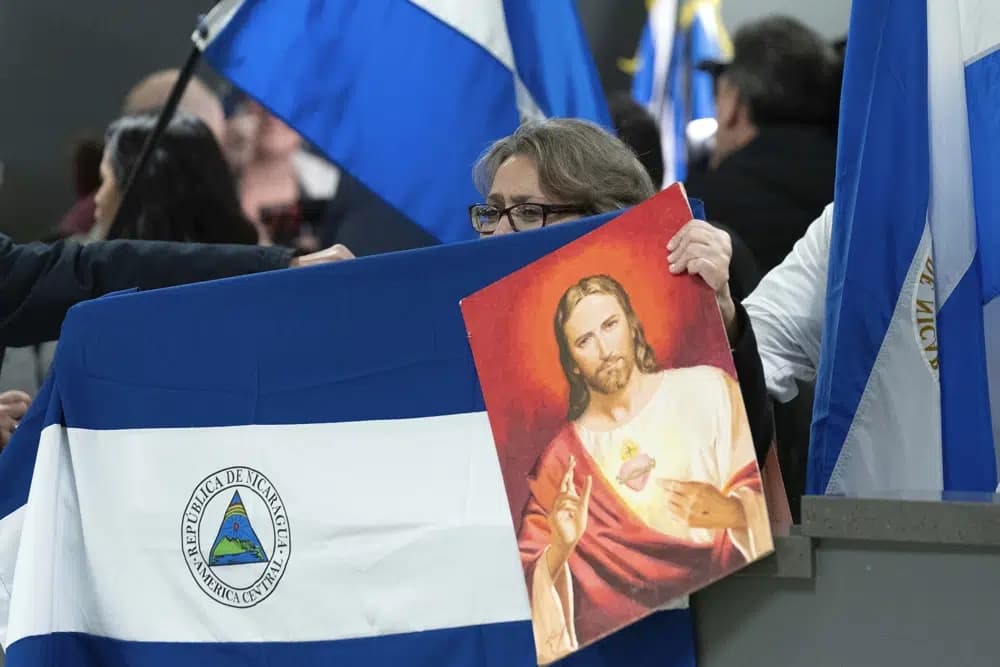NEW YORK – In the wake of the Nicaraguan government’s continuing crackdown on Catholics, which includes recently sentencing a bishop to 26 years in prison, the president of the U.S. bishops’ conference is calling for government intervention to restore human rights in the Central American nation.
After refusing exile, Bishop Rolando Álvarez of Matagalpa, Nicaragua, was sentenced to 26 years in prison by the government on Feb. 10, stripped of his citizenship and given a large fine on charges of treason, undermining national integrity and spreading false news.
“His sentencing marks yet another escalated human rights violation in the ongoing ordeal the Catholic Church faces in Nicaragua,” Archbishop Timothy Broglio of the Archdiocese for the Military Services, USA, and president of the US bishops’ conference, said in a Feb. 21 statement.
“Yet in this dark hour, courageous hope, charity, and solidarity are bearing witness to the enduring vitality of the faith of the people of Nicaragua and among Catholics worldwide supporting the Nicaraguan faithful,” he continued.
A spokesperson told Crux that the U.S. State Department “condemns this action by the Government of Nicaragua and urges Bishop Alvarez’s immediate release,” adding that it appreciates Pope Francis’s “strong advocacy” on Alvarez’s behalf.
“We will continue to promote accountability for the Ortega-Murillo regime, reiterate our call for the immediate and unconditional release of Monsignor Álvarez, and urge the restoration of civic space for the people of Nicaragua,” the spokesperson said.
Nicaraguan President Daniel Ortega’s crackdown on the Catholic faith in recent years has intensified, with the arrests of several priests, expulsion of missionaries, shut down of Catholic radio stations, the closing of a Catholic university, and even the banning of a Catholic procession and pilgrimage in the capital city of Managua last August.
The heightened tension can be traced back to spring 2018, when Ortega accused church leaders of attempting to overthrow the government when they acted as mediators after deadly protests broke out that left more than 300 people dead.
Ortega, who has been in power since 2007, is known to jail and persecute challengers to his authority, and that extends beyond just Catholics. The day before Álvarez was sentenced 222 Nicaraguans arrived on U.S. soil after being exiled by the Nicaraguan government, many of whom were Ortega opponents.
Broglio questioned the actions of the Ortega government, asking, “How can any regime deny citizenship to its citizens?”
The archbishop also cited recent remarks from Pope Francis that ‘through an open and sincere dialogue, the basis for a respectful and peaceful coexistence might still be found,’ and called on the U.S. government to intervene to stop the Nicaraguan government’s human rights abuses.
“I also call on the U.S. government and other partners to continue to pursue the release of Bishop Álvarez and the restoration of human rights in Nicaragua,” Broglio said.
The U.S. Catholic Church has been at the forefront of responding to the needs of many of the exiled.
The Archdiocese of Chicago on Feb. 19 announced that it was welcoming Father Erick Diaz, an exiled priest from the Diocese of Matagalpa, who has stood in solidarity with Álvarez. In a statement, Cardinal Blase Cupich applauded his courage and said the archdiocese is happy to have him.
“In solidarity with the suffering Church of Nicaragua, I have offered hospitality and welcome to a courageous priest who, with many of his brothers, stood with his bishop as a witness to the human rights of their people,” Cupich said. “The Church of Chicago is blessed to have them with us.”
“We call for an immediate end to the systemic persecution of the Church in Nicaragua through false accusations, the closure of Catholic radio stations, the blocking of access to Churches, and other serious acts that violate religious freedom and the social order,” he continued.
Archbishop Thomas Wenski of Miami announced that the archdiocese offered four or five priests, a couple of seminarians, a deacon, and an organist among those expelled on Feb. 9 long term housing at St. John Vianney College Seminary in Miami. There, Wenski said, they will have the opportunity to take “intensive English classes while they finalize their immigration paperwork.
In his Feb. 21 statement, Broglio applauded the work of the U.S. Catholic church to welcome the exiles.
“I am proud and grateful that the Catholic community of the United States—from dioceses and local Catholic Charities agencies to Catholic Charities USA and the USCCB—was among those that mobilized quickly to welcome the Nicaraguan exiles as they were stripped of their citizenship before boarding the plane,” Broglio said.
“These 222 individuals were welcomed on U.S. soil on February 9 and are being assisted by U.S. government authorities and partners,” he said.
Follow John Lavenburg on Twitter: @johnlavenburg












